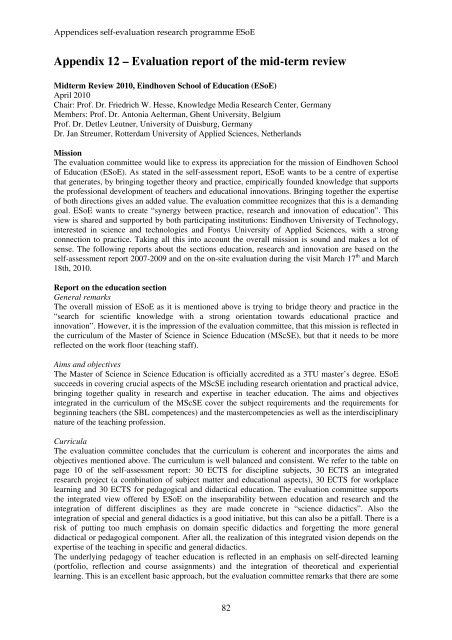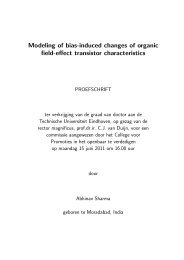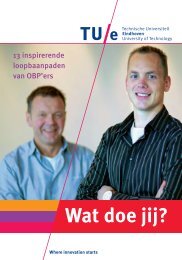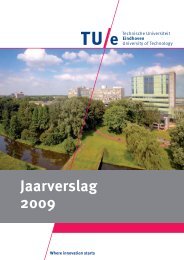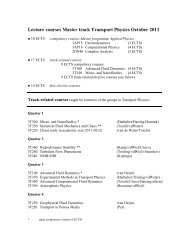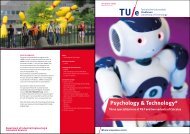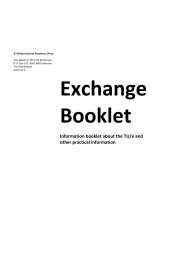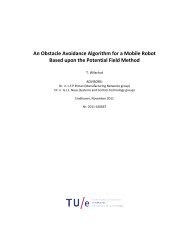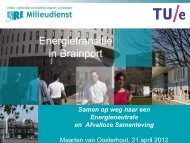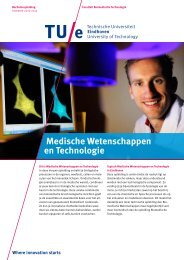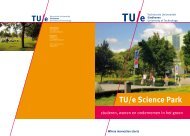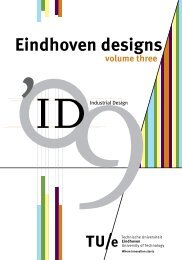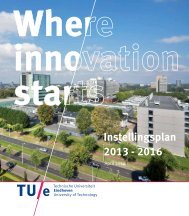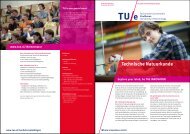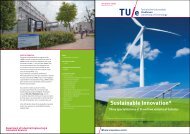Self-evaluation - Technische Universiteit Eindhoven
Self-evaluation - Technische Universiteit Eindhoven
Self-evaluation - Technische Universiteit Eindhoven
You also want an ePaper? Increase the reach of your titles
YUMPU automatically turns print PDFs into web optimized ePapers that Google loves.
Appendices self-<strong>evaluation</strong> research programme ESoE<br />
Appendix 12 – Evaluation report of the mid-term review<br />
Midterm Review 2010, <strong>Eindhoven</strong> School of Education (ESoE)<br />
April 2010<br />
Chair: Prof. Dr. Friedrich W. Hesse, Knowledge Media Research Center, Germany<br />
Members: Prof. Dr. Antonia Aelterman, Ghent University, Belgium<br />
Prof. Dr. Detlev Leutner, University of Duisburg, Germany<br />
Dr. Jan Streumer, Rotterdam University of Applied Sciences, Netherlands<br />
Mission<br />
The <strong>evaluation</strong> committee would like to express its appreciation for the mission of <strong>Eindhoven</strong> School<br />
of Education (ESoE). As stated in the self-assessment report, ESoE wants to be a centre of expertise<br />
that generates, by bringing together theory and practice, empirically founded knowledge that supports<br />
the professional development of teachers and educational innovations. Bringing together the expertise<br />
of both directions gives an added value. The <strong>evaluation</strong> committee recognizes that this is a demanding<br />
goal. ESoE wants to create “synergy between practice, research and innovation of education”. This<br />
view is shared and supported by both participating institutions: <strong>Eindhoven</strong> University of Technology,<br />
interested in science and technologies and Fontys University of Applied Sciences, with a strong<br />
connection to practice. Taking all this into account the overall mission is sound and makes a lot of<br />
sense. The following reports about the sections education, research and innovation are based on the<br />
self-assessment report 2007-2009 and on the on-site <strong>evaluation</strong> during the visit March 17 th and March<br />
18th, 2010.<br />
Report on the education section<br />
General remarks<br />
The overall mission of ESoE as it is mentioned above is trying to bridge theory and practice in the<br />
“search for scientific knowledge with a strong orientation towards educational practice and<br />
innovation”. However, it is the impression of the <strong>evaluation</strong> committee, that this mission is reflected in<br />
the curriculum of the Master of Science in Science Education (MScSE), but that it needs to be more<br />
reflected on the work floor (teaching staff).<br />
Aims and objectives<br />
The Master of Science in Science Education is officially accredited as a 3TU master’s degree. ESoE<br />
succeeds in covering crucial aspects of the MScSE including research orientation and practical advice,<br />
bringing together quality in research and expertise in teacher education. The aims and objectives<br />
integrated in the curriculum of the MScSE cover the subject requirements and the requirements for<br />
beginning teachers (the SBL competences) and the mastercompetencies as well as the interdisciplinary<br />
nature of the teaching profession.<br />
Curricula<br />
The <strong>evaluation</strong> committee concludes that the curriculum is coherent and incorporates the aims and<br />
objectives mentioned above. The curriculum is well balanced and consistent. We refer to the table on<br />
page 10 of the self-assessment report: 30 ECTS for discipline subjects, 30 ECTS an integrated<br />
research project (a combination of subject matter and educational aspects), 30 ECTS for workplace<br />
learning and 30 ECTS for pedagogical and didactical education. The <strong>evaluation</strong> committee supports<br />
the integrated view offered by ESoE on the inseparability between education and research and the<br />
integration of different disciplines as they are made concrete in “science didactics”. Also the<br />
integration of special and general didactics is a good initiative, but this can also be a pitfall. There is a<br />
risk of putting too much emphasis on domain specific didactics and forgetting the more general<br />
didactical or pedagogical component. After all, the realization of this integrated vision depends on the<br />
expertise of the teaching in specific and general didactics.<br />
The underlying pedagogy of teacher education is reflected in an emphasis on self-directed learning<br />
(portfolio, reflection and course assignments) and the integration of theoretical and experiential<br />
learning. This is an excellent basic approach, but the <strong>evaluation</strong> committee remarks that there are some<br />
82


